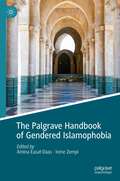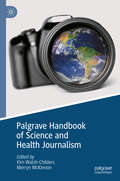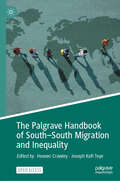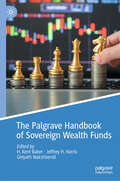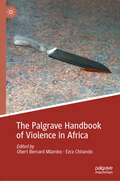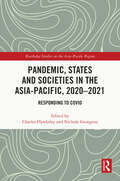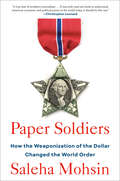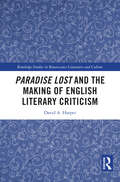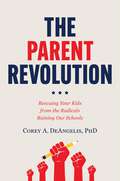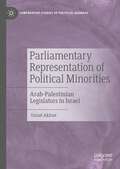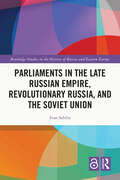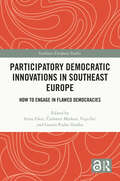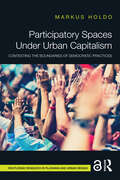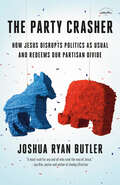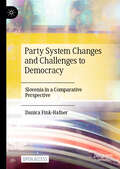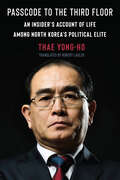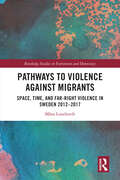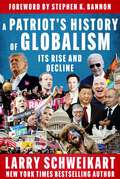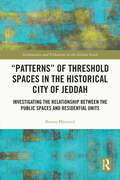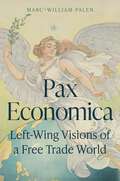- Table View
- List View
The Palgrave Handbook of Gendered Islamophobia
by Irene Zempi Amina Easat-DaasAgainst a backdrop of continually growing global Islamophobia, this handbook provides a comprehensive, interdisciplinary overview of the key issues, theories, debates, and developments in gendered Islamophobia, unpacking how Western, Orientalist constructions of Muslim men and women affect the lived experiences of Muslim men and women; impact social, legal, and criminological policies, practices, and discourse; and give rise to resistance against gendered Islamophobia. Drawing on theories from philosophy, sociology, gender studies, psychology and criminology, sections examine the interdisciplinary theoretical dimensions of gendered Islamophobia; illustrate the dynamics of gendered Islamophobia through the use of case examples in the UK, Europe, North America, Australasia, the Middle East, and South Asia. This handbook will be valuable reading for scholars, researchers, and policymakers around the globe in Gender Studies, Sociology, Criminology, Politics, and Law, whofocus on the intersections of gender and Islamopobia, and the impact on Muslim men and women respectively.
Palgrave Handbook of Science and Health Journalism
by Kim Walsh-Childers Merryn McKinnonThis handbook reviews the extant literature on the most important issues in health and science journalism, with a focus on summarizing the relevant research and identifying key questions that are yet to be answered. It explores challenges and best practices in health and science reporting, formats and audiences, key topics such as climate change, pandemics and space science, and the ethics and political impacts of science and health journalist practice. With numerous international contributions, it provides a comprehensive overview of an emerging area of journalism studies and science communication.
The Palgrave Handbook of South–South Migration and Inequality
by Heaven Crawley Joseph Kofi TeyeThis open access handbook examines the phenomenon of South-South migration and its relationship to inequality in the Global South, where at least a third of all international migration takes place. Drawing on contributions from nearly 70 leading migration scholars, mainly from the Global South, the handbook challenges dominant conceptualisations of migration, offering new perspectives and insights that can inform theoretical and policy understandings and unlock migration’s development potential. The handbook is divided into four parts, each highlighting often overlooked mobility patterns within and between regions of the Global South, as well as the inequalities faced by those who move. Key cross-cutting themes include gender, race, poverty and income inequality, migration decision making, intermediaries, remittances, technology, climate change, food security and migration governance. The handbook is an indispensable resource on South-South migration and inequality for academics, researchers, postgraduates and development practitioners.
The Palgrave Handbook of Sovereign Wealth Funds
by H. Kent Baker Jeffrey H. Harris Ghiyath NakshbendiThe Palgrave Handbook of Sovereign Wealth Funds provides a comprehensive, detailed analysis of these funds from a multidimensional perspective consisting of 33 chapters divided into seven sections. Section I provides background material about SWFs, providing a foundation for the remainder of the handbook. Section II examines various controversies, governance, and accountability topics involving SWFs. Section III discusses the political, legal, and tax aspects of SWFs. Section IV reviews numerous topics involving SWF management. Section V deals with SWFs’ policies, preferences, and performance. Section VI provides descriptive analyses of SWFs based on country or region. It also offers a comparison of SWF similarities and differences across countries. Section VII concludes by examining special issues and the future of SWFs.This handbook spans the gamut from theoretical to practical while offering the right balance of detailed and user-friendly coverage. Discussion of relevant research permeates the handbook. Although other books are available on SWFs, few are as comprehensive or provide a multidimensional perspective from academics and practitioners. This handbook fills a gap by showing how SWFs are a growing and dynamic force in international finance.
The Palgrave Handbook of Violence in Africa
by Obert Bernard Mlambo Ezra ChitandoThis handbook brings together global research on violence in Africa from academics, practitioners and activists across a multitude of subjects. It seeks to create the widest possible space for debate, discussion, and analysis of the broad range of issues and problems of violence. It transcends disciplinary and geographic borders in order to create new ground in this space. The chapters in this handbook cover diverse themes such as: the topography of violence, technologies of violence, terrorism, civil war and insurgent violence, child soldiers and violence, epistemic violence, structural violence, violence and memory, violence and the law, cultural mechanisms for creating, sustaining, resisting, and mitigating violence, political violence, violence in moments of religious, social and geo-political transformation, gender and violence, violence against nature, and violence and social media. It centralises new meanings, understandings and fresh ideas to the concept ofviolence, broadening its scope, and contributing to the debates that will shape Africa’s common future. It shines a light on key elements of African culture and the cultural mechanisms for creating, sustaining, resisting, and mitigating violence in Africa. It strives to be relevant to the needs and concerns of African societies by suggesting practical solutions for overcoming violence. This book ties in with development initiatives in Africa, such as Agenda 2063, for the Africa We Want, and the 2030 United Nations Sustainable Development Goals (SDGs).
Pandemic, States and Socieites in the Asia-Pacific, 2020-2021: Responding to COVID (Routledge Studies on the Asia-Pacific Region)
by Charles Hawksley Nichole GeorgeouHawksley and Georgeou bring together scholars and practitioners from across the region to analyse the main effects of the first two years of the COVID pandemic in a range of case studies from Southeast Asia, East Asia, South Asia, and Oceania. The book provides a broad survey of how Indonesia, Bangladesh, Japan, the Philippines, Vietnam, Nepal, Australia, Cambodia, Taiwan, and New Zealand attempted to manage the COVID pandemic; the challenges they faced; and how they fared. Drawing on insights from politics, economics, sociology, law, public health, education, and geography, most authors are nationals of the cases they discuss. Written in non-specialist language, ten case studies are examined, providing a useful analysis of the first two years of COVID in the Asia-Pacific from the emergence of COVID in January 2020 to the lifting of restrictions in December 2021. Chapters focus on different issues according to the scholar’s academic expertise, and a wide diversity of national pandemic experiences, challenges, and responses are showcased. An essential read for scholars and students interested in the areas of Asia-Pacific politics, sociology, and public health.
Paper Soldiers: How the Weaponization of the Dollar Changed the World Order
by Saleha Mohsin"Incisive debut treatise... Mohsin brings to the proceedings a reporter's eye for story" — Publisher's WeeklyFrom Bloomberg News reporter Saleha Mohsin, the untold story of how one of America&’s most invincible institutions—the Treasury—has used the U.S. dollar to define America&’s role in the world, and our economic future.In 1995, Treasury Secretary Robert Rubin re-defined the next thirty years of currency policy with the mantra, &“A strong dollar is in America&’s interest.&” That mantra held, ushering in exceptional prosperity and cheap foreign goods, but the strong dollar policy also played a role in the devastating hollowing out of America&’s manufacturing sector. Meanwhile, abroad, the United States increasingly turned to the dollar as a weapon of war. In Paper Soldiers, Saleha Mohsin reveals how the Treasury Department has shaped U.S. policy at home and overseas by wielding the American dollar as a weapon—and what that means in a new age of crisis.For decades, America has preferred its currency superpower-strong, the basis of a "strong dollar" policy that attracted foreign investors and pleased consumers. Drawing on Mohsin's unparalleled access to current and former Treasury officials like Robert Rubin, Steven Mnuchin, and Janet Yellen, Paper Soldiers traces that policy's intended and unintended consequences, including the rise of populist sentiment and trade war with China—culminating in an unprecedented attack on the dollar&’s pristine status during the Trump presidency—and connects the dollar's weaponization from 9/11 to the deployment of crippling financial sanctions against Russia. Ultimately, Mohsin argues that, untethered from many of the economic assumptions of the last generation, the power and influence of the American dollar is now at stake.With first-hand reporting and fresh analysis that illustrates the vast, often unappreciated power that the Treasury Department wields at home and abroad, Paper Soldiers tells the inside story of how we really got here—and the future not only of the almighty dollar, but the nation&’s teetering role as a democratic superpower.
Paradise Lost and the Making of English Literary Criticism (Routledge Studies in Renaissance Literature and Culture)
by David A. HarperParadise Lost and the Making of English Literary Criticism identifies the early reception of Paradise Lost as a site of contest over the place of literature in political and religious controversy. Milton’s earliest readers and critics (Dryden, Addison, Dennis, Hume, and Bentley) confronted a poem and author at odds with prevailing culture and the revanchist conservatism of the restored monarchy. Grappling with the epic required navigating Milton’s reputation as a “fanatick” who had called in print for Charles I’s execution, inveighed openly against monarchy on the eve of Charles II’s return, and held heretical views on the trinity, baptism, and divorce. Harper argues that foundational figures in English literary criticism rose to this challenge by innovating new ways of reading: producing creative (and subversive) rewritings of Paradise Lost, articulating new theories of the sublime, explaining the poem in the first substantial body of annotations for an English vernacular text, and by pioneering early forms of textual criticism and editing.
A Paradise of Small Houses: The Evolution, Devolution, and Potential Rebirth of Urban Housing
by Max PodemskiFrom the Haitian-style &“shotgun&” houses of the 19th century to the lavish high-rises of the 21st century, a walk through the streets of America&’s neighborhoods that reveals the rich history—and future—of urban housingThe Philadelphia row house. The New York tenement. The Boston triple-decker. Every American city has its own iconic housing style, structures that have been home to generations of families and are symbols of identity and pride. Max Podemski, an urban planner for the city of Los Angeles and lifelong architecture buff, has spent his career in and around these buildings. Deftly combining his years of experience with extensive research, Podemski walks the reader through the history of our dwelling spaces—and offers a blueprint for how time-tested urban planning models can help us build the homes the United States so desperately needs.In A Paradise of Small Houses, Podemski charts how these dwellings have evolved over the centuries according to the geography, climate, population, and culture of each city. He introduces the reader to styles like Chicago&’s prefabricated workers cottages and LA&’s car-friendly dingbats, illuminating the human stories behind each city&’s iconic housing type. Through it all, Podemski interrogates the American values that have equated home ownership with success and led to the US housing crisis, asking, &“How can we look to the past to build the homes, neighborhoods, and cities of the future that our communities deserve?&”
The Parent Revolution: Rescuing Your Kids from the Radicals Ruining Our Schools
by Dr. Corey A. DeAngelisFrom the leader of the online army in America's parental rights movement comes the real story of how moms and dads across the country are turning the tide against radical activists in public schools. It&’s no secret that our government-run public education system has held generations of Americans hostage. The teachers unions—the government&’s stormtroopers—have been hard at work running a mass misinformation campaign to convince parents that because this is how it has always been, this is how it has to be. But here&’s what you may not realize: the parents are winning, and we have entered the death spiral of the education dictatorship. The school choice revolution is here, and moms and dads are successfully restoring parental rights in education, one state, one school district at a time. In The Parent Revolution, Dr. Corey A. DeAngelis–public enemy #1 of the teachers' unions – takes readers inside this movement like no one else can. As Vox reported in late 2023, DeAngelis has become &“the public face&” of the effort, &“traveling from state to state, holding rallies, making media appearances, and tweeting constantly.&” Or as another education voice put it, &“No one in education policy, advocacy, or activism has ever lived rent-free in more heads at once than Corey DeAngelis.&” As America&’s most prominent and influential advocate of school choice, DeAngelis unapologetically argues why parents and political leaders must lean into the culture war taking place in schools. He exposes the hypocritical elites who are content to hold other people&’s children captive to poorly run government schools while sending their own children to the best private and charter schools out there. And most importantly, he equips readers with the ability to make sure the potent forces of the educational industrial complex don&’t regain their footing.
Parliament in Ethiopia: Participation, Representation and Resistance (African Governance)
by Mercy Fekadu MulugetaAfrican legislatures remain understudied, yet democratisation, development and peacebuilding all depend on these key political institutions. This book provides an in-depth analysis of Ethiopia’s parliament, a country of key political and strategic importance to the whole region. In 1931, Ethiopia’s monarchical government introduced a system of parliamentary democracy with seemingly contradictory objectives; it wanted to legitimize its rule in a changing world, and also needed to provide a respectable retirement vocation (as senators and deputies) to sections of the aristocracy it ousted from power. This paradox of recognizing the parliament as essential to modern governance yet deliberately seeking weak institutions that are unable or unwilling to challenge those in power continues to haunt the parliament to this day. Ethiopia continues to struggle to maintain political stability, and the separation of power between government and parliament and a system of checks and balances are yet to substantially flourish. Drawing on extensive original data gathered from interviews and surveys, this book investigates the legal and practical status of federal representative institutions in Ethiopia from 1931 up to and including 2021. It delves into the rules and routines of parliament, its contextually and historically grounded culture of representation, and the techniques of manoeuvring executive bureaucracies. The book also aims to understand the extent of civil dis/engagement and the perceptions and role of citizens in shaping parliament, and how the mandates and functions of individual MPs are also determined by cultural and socio-economic factors such as gender, population, inequality and conflict. This book’s in-depth and original analysis will be of interest to researchers across African studies, politics, development, and governance.
Parliamentary Representation of Political Minorities: Arab-Palestinian Legislators in Israel (Comparative Studies of Political Agendas)
by Osnat AkiravThis book assesses parliamentary speeches given by Arab representatives in the Israeli Knesset over the last 70 years, in order to throw light on the representation of political minorities. It examines several political ‘identities’ available to legislators with intersectional representation – including gender, religion and nationality – and considers the ways in which legislators utilise these various identities when representing their constituencies to further their political aims. The book also puts forward a new theoretical framework to better assess intersectional representation, especially in multi-national settings. It will appeal to all those interested in public policy, political representation, and comparative politics, as well Middle Eastern politics.
Parliaments in the Late Russian Empire, Revolutionary Russia, and the Soviet Union (Routledge Studies in the History of Russia and Eastern Europe)
by Ivan SablinThis book examines the meanings that were attached to the terms “parliament” and “parliamentarism” in the different historical and discursive contexts of the late Russian Empire, revolutionary and Soviet Russia, and the Soviet Union. It discusses those institutions referred to as parliaments by contemporaries, gives special attention to their functions, and traces the broader debates on parliamentarism within Russia and the Soviet Union, in Russian émigré circles, and among foreign observers. It highlights that only the late imperial and perestroika assemblies can be considered legislative institutions that expressed dissensus but argues that other assemblies, often referred to as “rubber-stamp” parliaments due to their lack of legislative competence and influence over other authorities, should not be dismissed. The Supreme Soviet, for instance, provided an integrative function binding society and elites in a top-down manner, while its deputies engaged in information acquisition and state micromanagement through interactions with their constituents. It also played an important role in interparliamentary relations and, as one of the first institutions of nominal parliamentarism in an autocratic single-party regime, of which there were many in the twentieth century, served as a model for numerous state socialist regimes. By addressing the role of parliaments in reassembling imperial spaces through political representation and the functions of nominal legislative institutions, the book explores the contribution of Russian and Soviet assemblies to global political modernity.
Participatory Democratic Innovations in Southeast Europe: How to Engage in Flawed Democracies (ISSN)
by Irena Fiket Čedomir Markov Vujo Ilić Gazela Pudar DraškoThis volume strengthens the dialogue between conceptual perspectives, approaches and fields on deliberative and participatory forms of democratic innovation and offers novel insights, focusing on the Southeast European space. Traditional forms of participation seem insufficient in satisfying the growing complexity of the democratic processes, especially in the context of autocratizing societies. It is crucial to examine the possibilities of democratic innovation in political research and practice, trying to establish a connection between the possibilities and limits of representative democracy and social movements as possible carriers of the process of democratic innovation. This book offers novel insights into practices of civil society and social movements and their pathways carved to initiate a deep change in political thinking and practice and compelling insights for scholars and students of Southeast Europe, social movements and democracy.
Participatory Spaces Under Urban Capitalism: Contesting the Boundaries of Democratic Practices (Routledge Research In Planning And Urban Design Ser.)
by Markus HoldoCan people use new participatory spaces to reclaim their rights as citizens and challenge structures of political power? This book carefully examines the constraints and possibilities for participatory governance under capitalism. To understand what is at stake in the politics of participation, we need to look beyond the values commonly associated with it. Citizens face a dilemma: should they participate, even if this helps to sustain an unjust system, or not participate, thereby turning down rare opportunities to make a difference? By examining the rationale behind democratic innovation and the reasons people have for getting involved, this book provides a theory of how citizens can use new democratic spaces to challenge political boundaries. Connecting numerous international case studies and presenting original research from Rosario, Argentina, this book offers a crucial corrective to previous research. What matters most is not the design of new models of participation nor is it the supposed radical imagination of political leaders. It is whether people use new spaces for participation to renegotiate what democracy means in practice. Bridging critical urban studies and democratic theory, this book will be of interest to researchers and students in the fields of democratic innovations, political economy and urban planning. It will also provide activists and practitioners of participatory democracy with important tools to expand spaces of grassroots democracy.
Partisan Hostility and American Democracy: Explaining Political Divisions and When They Matter (Chicago Studies in American Politics)
by Matthew Levendusky James N. Druckman John Barry Ryan Samara Klar Yanna KrupnikovAn unflinching examination of the effects and boundaries of partisan animosity. For generations, experts argued that American politics needed cohesive parties to function effectively. Now many fear that strong partisan views, particularly hostility to the opposing party, are damaging democracy. Is partisanship as dangerous as we fear it is? To provide an answer, this book offers a nuanced evaluation of when and how partisan animosity matters in today’s highly charged, dynamic political environment, drawing on panel data from some of the most tumultuous years in recent American history, 2019 through 2021. The authors show that partisanship powerfully shapes political behaviors, but its effects are conditional, not constant. Instead, it is most powerful when politicians send clear signals and when an issue is unlikely to bring direct personal consequences. In the absence of these conditions, other factors often dominate decision-making. The authors argue that while partisan hostility has degraded US politics—for example, politicizing previously non-political issues and undermining compromise—it is not in itself an existential threat. As their research shows, the future of American democracy depends on how politicians, more than ordinary voters, behave.
The Party Crasher: How Jesus Disrupts Politics as Usual and Redeems Our Partisan Divide
by Joshua Ryan ButlerIn this insightful, nonpartisan roadmap toward faithful political engagement and ultimate allegiance to Jesus, pastor Joshua Ryan Butler diagnoses the roots of political conflict tearing apart the church and prescribes a practical and prophetic way forward.&“A must-read for any and all who seek the way of Jesus.&”—Jay Kim, pastor and author of Analog ChristianHave you noticed a deeper level of political division in your community or church? If so, you&’re not alone. This powerful, accessible book exposes the religious nature of modern political movements and how they compete with faithfulness to Christ.Rather than retreat from the political realm, The Party Crasher will help you understand the politics of our age and equip you with the wisdom to faithfully navigate them. Key takeaways include:• How to develop a Christian posture for political life and promote unity in the church.• When to be bold.• How to identify and repent from our political idols.• How the way we worship can help us avoid division.This is not a book about putting politics aside, it&’s a book about putting politics in their place so that we might be better disciples of Jesus in whichever party or place we find ourselves.
Party Organization and Electoral Success of New Anti-establishment Parties (Routledge Studies on Political Parties and Party Systems)
by Tomáš CirhanThis book examines the new anti-establishment parties electorally succeeding at the expense of their established counterparts and argues that party organization matters for the electoral success of anti-establishment parties. It explores a relationship between these parties´ electoral success and their party organization. Using a framework to explain the role of organizational features such as local party branches, party membership, and party elites in this process, it reveals how they help parties to be more stable, cohesive, and legitimate; a state that facilitates better conditions for electoral success. It also shows that control over party organization is achieved partially by the existence of a corporate network associated with party leaders´ businesses. This book will be of key interest to scholars and students of party politics and political parties, anti-establishment politics, and Eastern European politics.
Party System Changes and Challenges to Democracy: Slovenia in a Comparative Perspective
by Danica Fink-HafnerThis open access book focuses on the nexus between “party system stability” and “democratic consolidation”, using Slovenia as a case study. Its findings are presented from a comparative perspective to illustrate the commonalities and differences found in research on Central European post-socialist countries and former Yugoslav countries. On the one hand, Slovenia’s characteristics (including the characteristics of its transition to democracy) are far more similar to those of Central European post-socialist countries than Western Balkan countries. On the other, Slovenia shares some similarities with other parts of the former Yugoslavia – especially its experiences with the political system of socialist self-management, elements of a market economy under socialism, and war following the end of socialism (albeit the conflict in Slovenia was very short and rather mild in comparison to those in other parts of socialist Yugoslavia). Slovenia’s experiences with rapid but limited democraticbacksliding under the Janša government (March 2019–June 2022) were halted by the 2022 national election – in contrast to the more widely known cases of Hungary and Poland, where such backsliding took place incrementally over a longer period of time that included several election cycles.
Passcode to the Third Floor: An Insider's Account of Life Among North Korea's Political Elite
by Thae Yong-hoThae Yong-ho was a leading North Korean diplomat to the United Kingdom and Northern Europe—until his dramatic defection to South Korea in 2016. In this gripping tell-all, he reveals the inner workings of the North Korean regime and shares the story of his decision to leave.Thae spent nearly three decades working under three generations of the ruling Kim dynasty after entering the foreign service as an idealistic twenty-seven-year-old “red warrior” eager to strive for the “socialist motherland.” During this time, he witnessed the arbitrary and tyrannical rule of the Kim family and the enigmatic “Third Floor,” a powerful group of high-ranking officials. Thae provides up-close portraits of the excesses of the North Korean elite and the depths of the cult of personality around the Kims, describing experiences such as concocting reports of Europeans celebrating the birthdays of Kim Il-sung or Kim Jong-il and escorting Kim Jong-un’s older brother to Eric Clapton concerts in London. He also details the economic and political consequences of North Korea’s pursuit of the bomb and the immiseration of the vast majority of the population.Today a politician in South Korea who advocates unification, Thae offers a powerful plea for the families torn apart by the conflict—including his own, as his brother and sister likely now languish in prison camps. A best-seller in South Korea, Passcode to the Third Floor is an unparalleled look at North Korean politics and diplomacy, giving readers intimate access to the regime’s innermost secrets.
Pathways of Autocratization: The Tumultuous Journey of Bangladeshi Politics (Routledge Advances in South Asian Studies #44)
by Ali RiazPathways of Autocratization addresses contemporary global politics’ one of the most important questions: how does a country regress from a democracy to an autocracy? This book offers a novel framework for understanding the processes that erode democracy and lead to autocracy and explains a specific instance of democratic backsliding in Bangladesh: the world’s eighth most populous country. With probing analysis of events and trends of Bangladeshi politics, especially since 2009, the book contextualizes the country’s autocratization process within global trends and compares it with others which have trod a similar path in recent decades, including Bolivia, Cambodia, Hungary, Poland, the Philippines and Turkey. The book discusses the implications of institutional changes, the role of pliant media, the contribution of ideology, and the conduct of international actors in the autocratization process while also mapping future trajectories for the country. Succinct, incisive, and thought provoking, this book is rich in its theoretical robustness and empirical details. This is a must-read for anyone interested in understanding the dynamics of democratic backsliding and prospects for reversing this trend.
Pathways to Violence Against Migrants: Space, Time and Far Right Violence in Sweden 2012–2017 (Routledge Studies in Extremism and Democracy)
by Måns LundstedtPathways to Violence Against Migrants traces the different pathways, or combinations of causal mechanisms, that lead from non-violent opposition to migration into anti-migrant violence. Applying the conceptual apparatus of social movement studies (frames, relations, opportunities and collective emotions), the book develops six distinct sequences of causal mechanisms. These show how violence can develop through rapid processes of moral outrage and far right mobilisation, through long processes of uneven demobilisation and escalation, or independently of any nonviolent protest at all. The six pathways are developed through a comparative, mixed-methods study of 81 cases of anti-migrant violence in Sweden between 2012 and 2017. The cases involve various actors (ranging from unorganised youth gangs and village associations to neo-Nazi organisations) as well as very different types and intensities of violence (from death threats to arson attacks and bombings). Demonstrating the diversity of pathways to violence in a restricted setting and against a restricted category of targets, the book argues strongly against reducing the causes of violence to individual pathology, to ideological ”extremism”, or to any single explanatory model. This book will be of interest to researchers of political violence, the far right, anti-migrant politics, racism, and social movements.
A Patriot's History of Globalism: Its Rise and Decline
by Larry SchweikartLarry Schweikart has won wide acclaim for his number one New York Times bestseller, A Patriot&’s History of the United States. Now, with A Patriot's History of Globalism, Schweikart shows that globalism, or the attempt to form a one-world government is nothing new. In the wake of Napoleon's defeat in 1814, the globalists of the day (mostly monarchs) sought to create a governing arrangement for Europe. Within forty years, three of the major participants were at war with each other. After World War I, they tried again at Versailles, this time even more aggressively changing boundaries of nations and moving populations. That attempt only lasted twenty years before another major war between the participants. Yet again, after World War II, globalists used the threat of the atomic bomb to try to form an international government with the United Nations. Most recently, the World Economic Forum and World Health Organization are attempting to minimize nationalities with global control of money and medicine. But there are signs this tide has been reversed and is finally in decline. A Patriot's History of Globalism is the gold standard text for the history of globalism.
“Patterns” of Threshold Spaces in the Historical City of Jeddah: Investigating the Relationship Between the Public Spaces and Residential Units (Architecture and Urbanism in the Global South)
by Basma Massoud“Patterns” of Threshold Spaces in the Historical City of Jeddah explores the meaning of threshold spaces and investigates the relationship between the public spaces and residential units in the historical city of Jeddah, Saudi Arabia, while at the same time revisiting Christopher Alexander’s theory in his canonical 1977 book, A Pattern Language. This book questions and analyses “patterns” relating to the cultural, social, and environmental particularities of Jeddah, with special attention paid to the effect of gender segregation in the city’s urban configuration. It discusses the extension that has been undertaken through testing a concept from the urban design theory of the West (the United States and Canada) and applying it to an Islamic city to find patterns in four different scales, which form the basis of the investigation (body, building, street, and city). Empirical methods have been used in the context of historical Jeddah, through which patterns are investigated using different approaches for the different scales. The book aims to explore the meaning of threshold spaces in old Jeddah. Furthermore, it shows that there are eighteen patterns of threshold spaces in the old town: patterns that are solely related to this specific case study, as well as modified patterns to the ones explored by Christopher Alexander. This book shall allow not only a better understanding of the relationship between housing and the historical city but also an exploration of the role of the threshold space in shaping the old city of Jeddah. It will be of interest to researchers, students of architecture, urban planning and anthropology studies, and people involved in cultural heritage, both academics and practitioners.
Pax Economica: Left-Wing Visions of a Free Trade World
by Marc-William PalenThe forgotten history of the liberal radicals, socialist internationalists, feminists, and Christians who envisioned free trade as the necessary prerequisite for anti-imperialism and peaceToday, free trade is often associated with right-wing free marketeers. In Pax Economica, historian Marc-William Palen shows that free trade and globalisation in fact have roots in nineteenth-century left-wing politics. In this counterhistory of an idea, Palen explores how, beginning in the 1840s, left-wing globalists became the leaders of the peace and anti-imperialist movements of their age. By the early twentieth century, an unlikely alliance of liberal radicals, socialist internationalists, feminists, and Christians envisioned free trade as essential for a prosperous and peaceful world order. Of course, this vision was at odds with the era’s strong predilections for nationalism, protectionism, geopolitical conflict, and colonial expansion. Palen reveals how, for some of its most radical left-wing adherents, free trade represented a hard-nosed critique of imperialism, militarism, and war.Palen shows that the anti-imperial component of free trade was a phenomenon that came to encompass the political left wing within the British, American, Spanish, German, Dutch, Belgian, Italian, Russian, French, and Japanese empires. The left-wing vision of a “pax economica” evolved to include supranational regulation to maintain a peaceful free-trading system—which paved the way for a more liberal economic order after World War II and such institutions as the United Nations, the European Union, and the World Trade Organization. Palen’s findings upend how we think about globalisation, free trade, anti-imperialism, and peace. Rediscovering the left-wing history of globalism offers timely lessons for our own era of economic nationalism and geopolitical conflict.
